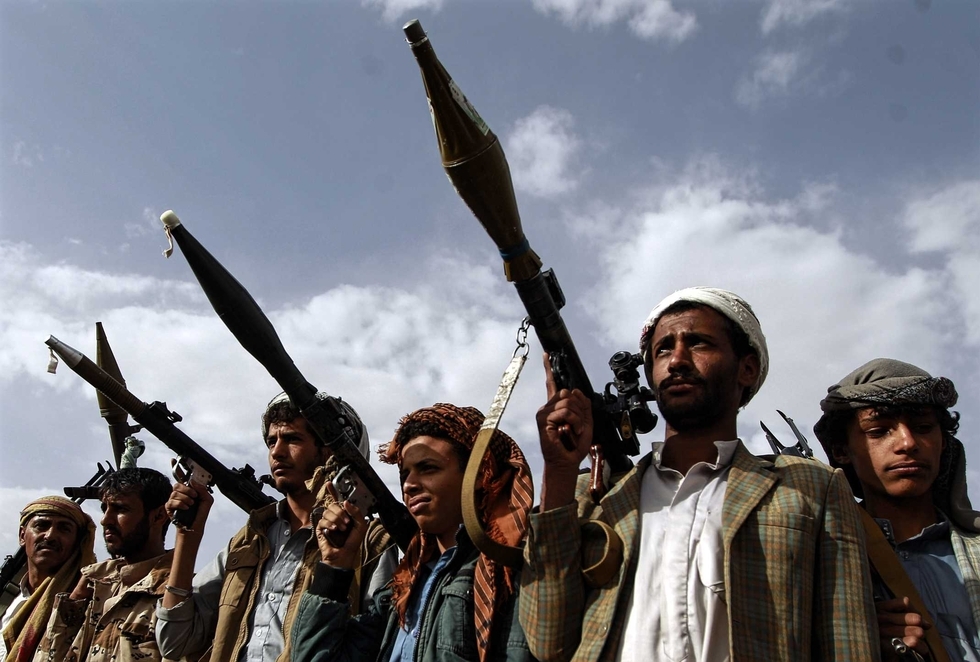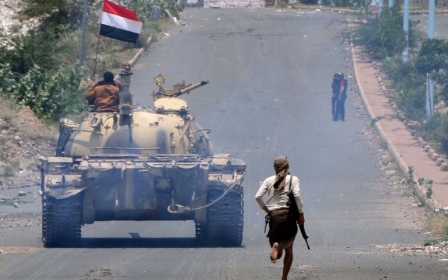Rebel, rebel: The protest songs of Yemen's war

Bilal al-Aghbari didn’t sing much about politics before 2011. Well-known in Yemen, he came third in Sharjah Star, an international talent competition, in 2007 in UAE.
Then the anti-government protests across the Middle East spread to his country – and Aghbari was sucked in. When the revolution against then-president Ali Abdullah Saleh broke out in 2011, Aghbari started to produce political songs for the first time.
Now he is a singer for the Yemeni Popular Resistance, which has been fighting Houthi rebels and their pro-Saleh allies around Taiz. "I participated in the revolution of 2011,” he said, “and now I am participating in the cultural war by producing inspiring songs for the fighters.
“Artistic resistance is half of the fight, and each person has to make the most of their strengths to resist invaders,” said Aghbari, whose songs - such as You Frighten Them - praise Hamoud al-Mikhlafi, the leader of the resistance in Taiz. Their purpose, he believes, is to encourage fighters, console the families of martyrs and encourage civilians to be patient.
Stay informed with MEE's newsletters
Sign up to get the latest alerts, insights and analysis, starting with Turkey Unpacked
He was injured by Houthi shelling at the start of this year, but that did not deter him: if anything, he has redoubled his efforts to sing.
Aghbari said: "In war, everyone has to serve the country in the best way possible. The best way for a singer to serve his or her country is through revolutionary songs."
When war songs rule the airwaves
When conflict breaks out in any country, there is also a cultural war, a drumbeat to accompany the fighting on the ground. Yemen is no exception, and much of this soft war has taken the form of revolutionary songs. The styles range from rock to more traditional forms such as "Zamel," a composition more reliant on lyrical poetry than instrumentation.
There are no numbers on how many songs have been released since the Yemen conflict escalated with the Saudi intervention in early 2015. But they drown out all other song types across the country, blaring from TV and radios on buses and cars.
I swear that I will not give up the purpose of the martyr / The martyr is the symbol of the revolution / I will remain revolutionist until he either achieves his purpose or dies
- 'I Swear To Be God's Martyr' by Bilalal-Aghbari
When the Houthis took over the capital, Sanaa, in September 2014, they stormed all the radio and TV stations and ordered that they promote only Houthi songs and shows. Meanwhile, the government and anti-Houthi media fled to Saudi Arabia, where they started afresh.
There are now about a dozen TV channels across Yemen, each playing songs sympathetic to different sides, in addition to the public and private radio stations. Songs also reach an audience on CD as well as online, although internet connections can be patchy amid the conflict.
Is the pen mightier than the sword?
The Houthis, like their battlefield rivals, have their own set of songs. Singers are usually not targeted by rival sides, so long as they keep away from battle and do not enter areas controlled by the enemy.
Houthi singers, however, keep a low profile. Many of them and their lyricists originally served as fighters. In February 2016, Houthi singer Lutf al-Qahoom was killed in the battle for Marib's Sirwah district while he was fighting against pro-government forces. His song We Do Not Care - see below - tells of how he and his comrades have no fear of war. Their subjects include the offensive by the Saudi-led "mercenaries" and offer encouragement to their own fighters.
"The purpose of the lyrics or songs is not to make the reputation of the singer,” said Abu Ayham, a Houthi lyricist, who goes by another name. “The purpose is to encourage heroes to withstand battle.”
Revolutionary songs leave a lasting impression on the hearts of fighters, said Ayham, who fought in Imran, al-Jawf and Marib and is now a member of the security committee in Sanaa
"All the military vehicles play revolutionary songs in the battlefield, as they raise the spirits of the fighters. They are a very important element in war and better if they come from fighters, who have experience in the field."
Then there are the singers of the southern resistance. They include Abood Khawaja, a famed singer in the Gulf, who has used his music to demand independence for the south of Yemen (see duet below)
The southern political activist, Awadh al-Shoaibi, said the songs of Khawaja give him a hope that independence will eventually come to the region.
"Singing is part of the war, and I cannot imagine any revolution without its own songs. That is why many of the cafeterias, buses and cars in Aden play the songs of the south," he told MEE.
How songs help with checkpoints
Revolutionary songs are obvious rallying points for followers, but for the wider population they can also serve a purpose.
'The faithfulness did not weaken/The free men keep their promises/Allah, help the free souls in this world/May Allah break the legs of people who retreat/Those who want honor have to be patient'
- 'Faithfulness Did Not Change' by Lutf al-Qahoom
Emmad Ahmed, a writer and founder of Yemen Media Guide, meanwhile looked into the future. He said: "The warring sides will reach an agreement, but the songs will remain a witness that singers participated in supporting one side to kill another," he told MEE.
Ahmed said that while many singers had lost their sources of income during the war, they declined to participate in the cultural war. This, he argued, was for the best.
“The cultural war is the worst war of all. Battles will finish and political sides will eventually be reconciled, but the revolutionary songs will remain forever, especially those which insult people."
Songs of convenience
For many Yemenis, the songs are vehicles of social convenience. The right tune can help a driver, for example, negotiate a checkpoint if the soldiers stopping them are on the same side as the singer.
Ridhwan Sultan, a bus driver, takes passengers from Taiz to Sanaa. He passes through dozens of checkpoints operated by both of the Houthis and the Popular Resistance - so he has a contrasting repertoire of songs in his vehicle to please both rivals.
"If you play the songs of the resistance in a Houthi checkpoint, then the Houthis will immediately arrest you," he said. "So when I reach a Houthi checkpoint I play their songs. I also do the same thing with the resistance, so I can pass easily from their checkpoints."
'If you play the songs of the resistance in a Houthi checkpoint then the Houthis will immediately arrest you'
- Ridhwan Sultan, bus driver
“They think I am a supporter, but all I want is to pass through without them inspecting me, as inspection of my passengers' bags usually takes time."
A rash of radio and TV channels has also created work opportunities for the young – even if they do not support the relevant cause.
A presenter on the Houthi radio station in Sanaa, The Sound of Population, told MEE on condition of anonymity because of security concerns: "I am not a supporter of the Houthis. But I know many presenters and producers who are working with Houthi radio and TV channels only to get money."
Middle East Eye delivers independent and unrivalled coverage and analysis of the Middle East, North Africa and beyond. To learn more about republishing this content and the associated fees, please fill out this form. More about MEE can be found here.




